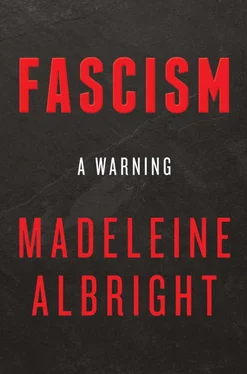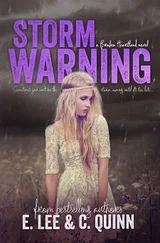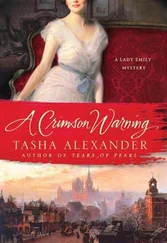One major democratic official who did not resign was Foreign Minister Jan Masaryk, a close friend of my father and of our family. The man I knew as “Uncle Jan” much preferred playing the piano to playing the diplomat; he had eyes that tried to mourn but twinkled anyway and a habit he could not shake of telling the truth. On the morning of March 10, his broken body was found in the ministry’s courtyard, below an open bathroom window. The new government, headed by Gottwald, insisted that the death was suicide; evidence pointed to murder.
The story of the Communist takeover of Czechoslovakia holds lessons that still need absorbing. Good guys don’t always win, especially when they are divided and less determined than their adversaries. The desire for liberty may be ingrained in every human breast, but so is the potential for complacency, confusion, and cowardice. And losing has a price. After 1948, Czechoslovakia had no room for democrats. In that Kafkaesque environment, the Czechs who had devoted every hour of World War II to fighting Hitler from London were accused of having spent their days instead plotting to enslave the working class. So, for the second time in my life, I was uprooted from the land of my birth. My father was asked to chair a UN commission investigating the dispute over Kashmir between India and Pakistan. When that assignment was complete, he applied for political asylum in the United States for himself and our family, a petition granted in June 1949.
CONTEMPLATING THE DEVASTATION WREAKED BY WORLD WAR I, the leaders of the international community showed what they had learned: not enough. The European victors wanted nothing more than to grab territory and exact revenge. The losers were impoverished and spoiling to get even. The United States arrived at the peace conference in Paris with lofty principles and a short attention span, ultimately rejecting its own proposed League of Nations and withdrawing smugly to its side of the ocean. The overall lack of effective joint action—following an ordeal that had left twenty million people dead and twenty-one million wounded—enabled Fascism to rise and led the world into the abyss of a second and even more catastrophic war.
After V-E Day, President Truman and his transatlantic colleagues were determined to work together where their predecessors had not. They hoped that their wartime alliance with the Soviet Union could be extended, but the Communist coup in Czechoslovakia, coupled with Masaryk’s murder, destroyed that illusion. Stalin had no intention of keeping his wartime promises; his plan was to dominate Central and Eastern Europe.
The West countered by forging a military alliance (NATO) and helping Greece and Turkey to fend off Communist subversion. Instead of retreating again into a cocoon across the sea, the United States championed an array of multilateral organizations, including the UN, the International Monetary Fund, and the World Bank. In 1949, Truman unveiled Point Four, a technical aid initiative designed to help people in distant corners of the globe raise their standard of living. Each of these steps was the product of enlightened international engagement, and each was implemented in the United States with strong bipartisan support. These accomplishments and the painstaking diplomacy that brought them into being should not be taken for granted or forgotten.
The Soviet Union in this period continued to exhibit many of the classic symptoms of Fascism. When the liberal columnist I. F. Stone visited Moscow in May 1956, he encountered a Communist party functionary who seemed eager to say what was on his mind, but when Stone prompted him, the Muscovite quickly developed second thoughts, finally muttering in German, “ Ili Schweigen ili Gefängnis ”—“Either silence or prison.”
That grim choice was a real one, because Communist governments showed a tendency to devour their own. Many postwar Communist leaders in Czechoslovakia and elsewhere in the region were later imprisoned or hanged, some on the direct orders of Stalin, some almost certainly because they were Jews. A distinctive vocabulary was developed to justify the arrests. Those condemned by show trials were called class traitors, enemies of the people, running dogs, bourgeois pigs, imperialist spies—and, naturally, when the Berlin Wall went up, the excuse given was to protect against Fascists.
In the West, we invented our own list of disparaging labels: red, pinko, fellow traveler, commie-symp. Concerned by the danger of Soviet espionage and determined not to replicate the appeasement policy that had smoothed Hitler’s path, U.S. politicians tried to outdo one another in appearing the most vigilant. Congressional committees demanded to know “Who Lost China?” and sought to root out traitors in the media, arts, labor movement, and all branches of government. The times called for a leader of wisdom and strength who could protect the country against subversion without getting tangled in the snares of paranoia and unreasoning fear. That was the need, but it was not who barged through the door.
SENATOR JOSEPH MCCARTHY—ANGRY, JOWLY, AND PERPETUALLY indignant—had the instincts of a Mussolini, but without the intellectual foundation. Like Il Duce, he was a showman who loved politics and craved power. Unlike him, he began his public life largely ignorant of policy. His temperament was that of a Fascist bully, but he was uncertain at first where to direct his fury. During McCarthy’s early years in the Senate, he tried to think up an angle that would make sensational news out of fur tariffs, public housing, sugar quotas, or Pentagon procurement. It was hard going. Early in 1950, with his reelection campaign on the horizon, he stepped up his quest for a headline-grabbing idea.
The answer, according to contemporary accounts, came during a friendly dinner in a Washington restaurant with three fellow Roman Catholics: a lawyer, a professor, and a prominent Jesuit priest. The lawyer recommended that McCarthy make a big push on behalf of the St. Lawrence Seaway—a massive construction project. Too dull, the group decided. The professor proposed a plan to give each old person in America a hundred dollars a month. Too expensive, they agreed. Finally, the priest spoke up: What about Communism and the threat to national security? How’s that for an issue? Just right. [6] McCarthy’s helpful Jesuit friend, Father Edmund Walsh, SJ, was dean of the Georgetown School of Foreign Service, later renamed in his honor. I teach at the Walsh School and have done so for more than twenty years. The faculty does not talk much about Father Walsh’s dinner date with McCarthy.
Thus was conceived a phenomenon that would split America from right to left and raise ominous questions—of a type we still face—about whether a democratic citizenry can be talked into betraying its own values.
Joe McCarthy had a barrel chest, blue eyes framed by shaggy brows, an abundance of restless energy, and experience as a chicken farmer. His down-to-earth speaking style pleased many voters, as did his reputation for shouting things that more conventional politicians were too timid to whisper. The senator’s skin, however, was paper-thin, and he seemed not to care very much whether his startling disclosures had any basis in fact.
Just one month after his fateful dinner in Washington, McCarthy told a women’s club in Wheeling, West Virginia, “I have in my hand a list of 205 names that were made known to the secretary of state as being members of the Communist Party and who nevertheless are still working and shaping policy in the State Department.”
There followed a three-year spectacle during which McCarthy captured enormous media attention by prophesying the imminent ruin of America and by making false charges that he then denied raising—only to invent new ones. He claimed to have identified subversives in the State Department, the army, think tanks, universities, labor unions, the press, and Hollywood. He cast doubt on the patriotism of all who criticized him, including fellow senators. McCarthy was profoundly careless about his sources of information and far too glib when connecting dots that had no logical link. In his view, you were guilty if you were or ever had been a Communist, had attended a gathering where a supposed Communist sympathizer was present, had read a book authored by someone soft on Communism, or subscribed to a magazine with liberal ideas. McCarthy, who was nicknamed Tailgunner Joe, though he had never been a tail gunner, was also fond of superlatives. By the middle of 1951, he was warning the Senate of “a conspiracy so immense and an infamy so black as to dwarf any previous such venture in the history of man.”
Читать дальше
Конец ознакомительного отрывка
Купить книгу












